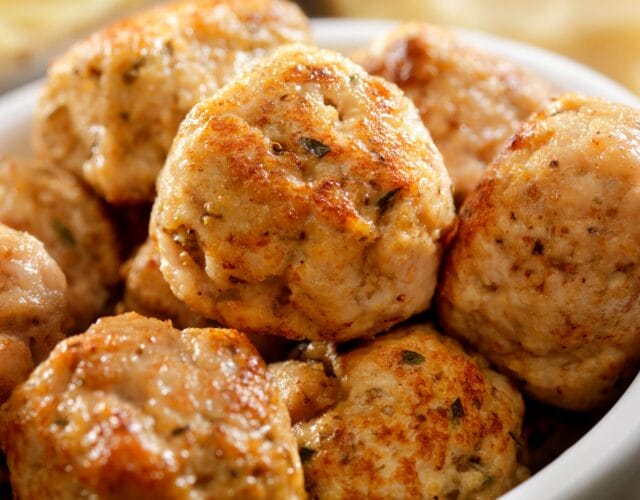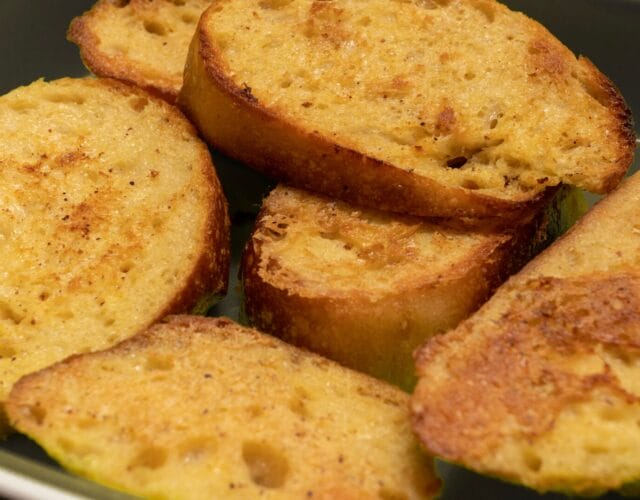Hi Everyone,
I am so excited to introduce you to Kelley Gilbert, Integrative Health Carolina’s health coach. She has joind our team this past month and has been busy creating a curriculum for education and workouts that are unmatched in this town. Moreover, she is also full of information and health tips. Today, she is talking about cooking oils.
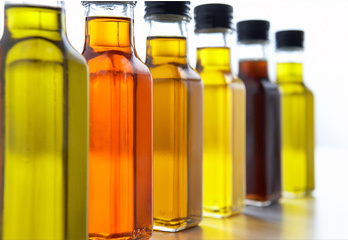
The Good, The Bad, and The Ugly
We have all read and heard about the importance of fruits, vegetables, grains, and protein but where does fat come into play in all of this? For a while it seemed that low fat diets were all the rage and anything containing fat was to be avoided. It was assumed that eating fat caused fat so people avoided it substituting chemicals and all sorts of substances to replace the fat in food. We now know that fat does not cause fat and can actually help us lose weight. That being said, a little bit of oil can be part of a healthy diet. However, before consuming oils it is important to know that not all oils are created equal and consuming certain oils can be down right dangerous to your health.
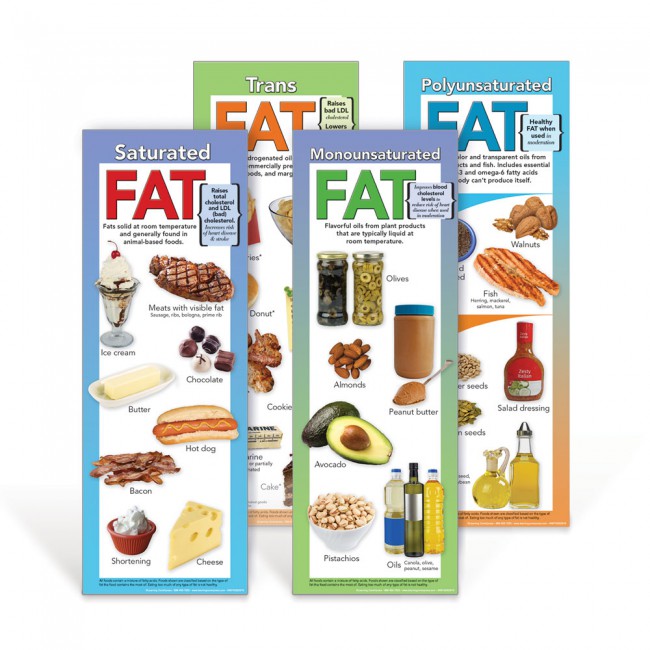
Types of fats:
Before we talk about which oils are good for you and which are not, it is important to have a basic understanding of fats. Fat can be broken down into 4 categories:
-
monosaturated
-
saturated,
-
polyunsaturated,
-
trans fats.
All fats are composed of fatty acids and the chemical composition of the chain determines the type of fat. All my science nerds out there, check this diagram out 👇🏻
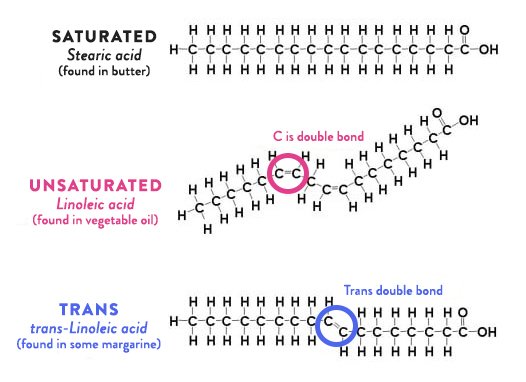
Trans Fats
Trans fats are usually labeled as hydrogenated and partially hydrogenated oil. You will find these types of oils in a lot of processed foods and fast foods. These oils are not natural. They are made by combining hydrogen with polyunsaturated oils. These unnatural oils are down right dangerous and can cause a myriad of health problems drastically increasing the risk of heart disease. These oils are in fact so dangerous that New York City banned the use of them in restaurants in 2007 and many cities are now doing the same. Be careful though, make sure to read food labels as a lot of processed food still contains these. Foods can call themselves “trans-fat free” even if they contain up to half a gram of trans fats per serving. Look on the ingredients list. If a food contains partially hydrogenated oils, it contains trans fats. Take a look at this food label as an example:
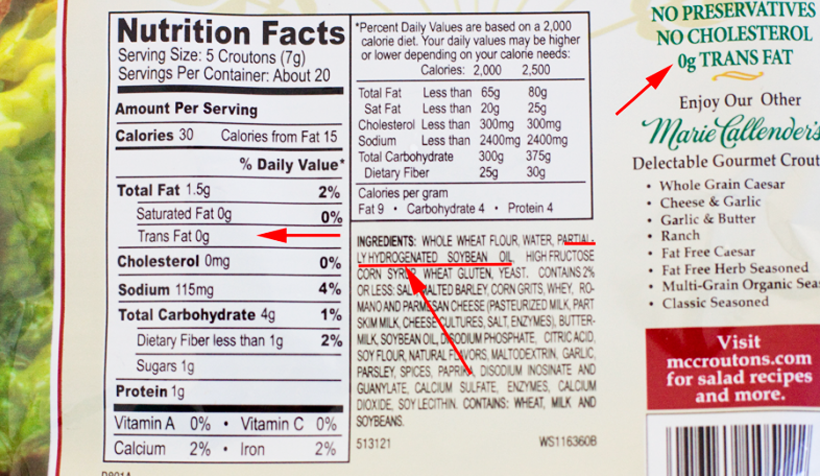
Polyunsaturated fats and oils
Polyunsaturated fats and oils are probably the most tricky to understand. Polyunsaturated fat is essential because our bodies cannot produce it. These are omega 3 and omega 6 fatty acids. The best way to get these fats is through whole food and not oil.
Examples of oils that are polyunsaturated that we want to avoid are the following”:
-
vegetable oil,
-
corn oil,
-
canola oil,
-
safflower oil,
-
soybean oil,
-
sunflower oil.
The problem with with polyunsaturated oils is that they form free radicals during the extraction process or when heated for cooking. Free radicals are known to initiate diseases such as cancer. The other major problem with these oils is that they contain an extremely uneven ratio of omega 6 to omega 3’s. One of the major causes of inflammation in the US is due to the increase of omega 6 in our food consumption and lack of omega 3. These oils are all extremely high in omega 6 and low in omega 3. Omega 6 is not bad for you and is actually essential to the body. However, it needs to be balanced with omega 3 or it causes inflammation. Optimally, we should strive for a 1:1 ratio of omega 6 to omega 3 in our diet but the average American is consuming a 16:1 ratio of omega 6 to omega 3!
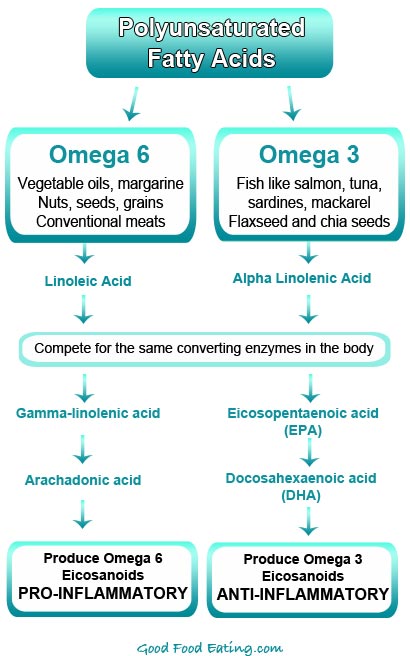
But wait there is more. Let’s take a look at how canola oil is made. Here’s an overly simplified version of the process as described by ThankYourBody
Step 1: Find some “canola seeds.” Oh wait, they don’t exist. Canola oil is actually made from a hybrid version of the rapeseed… most likely genetically modified and heavily treated with pesticides.
Step 2: Heat the rapeseeds at unnaturally high temperatures so that they oxidize and are rancid before you ever buy them.
Step 3: Process with a petroleum solvent to extract the oils.
Step 4: Heat some more and add some acid to remove any nasty wax solids that formed during the first processing.
Step 5: Treat the oil with more chemicals to improve the color.
Step 6: Deodorize the oil to mask the horrific smell from the chemical processing.
Of course, if you want to take your vegetable oils one step further, just hydrogenated it until it becomes a solid. Now you have margarine and all its trans-fatty wonder. And yes the American Heart Association recommends vegetable oil and margarine for those suffering from heart disease. To say that I am baffled, is an understatement.
Mono and Saturated Fats
Both mono and saturated fat can be healthy when consumed in moderation and include oils like:
-
coconut oil,
-
olive oil,
-
sesame oil,
-
avocado oil.
The solution: Unfortunately, most of the processed foods we eat today are made from unhealthy hydrogenated and polyunsaturated oils. This is because these oils are much cheaper to make and help increase profitability for food companies.
-
The easiest thing you can do to combat this is to increase your intake of omega 3. Wild-caught salmon, flaxseed oil, walnuts, and winter squash also contain high levels of omega 3 are great additions to any meal.
-
You can also take an omega 3 supplement. Most people use fish oil but if you eat a plant based diet like me, they do make plant based omega 3 supplements from algae.
-
The next step to improving your health would be to start reading food labels and not buying foods containing harmful oils in them. WARNING: this can be extremely frustrating! When I learned about how bad these oils were for me and started looking for them on food labels, I was shocked at how many of the foods I bought contained corn, safflower, sunflower, and soybean oil. Eliminating these oils is more difficult than just adding an omega 3 supplement to your diet but extremely beneficial to your overall health. I recommend starting small and slowly cutting back on these oils by tackling one food product at a time so you don’t get overwhelmed.
-
Another great option is to eat less pre-packaged food and make your own. Try making your own kale chips or sweet potato chips and use olive oil instead of the safflower/sunflower combination most potato chip companies use. Both of these are easy to make. I included one of my favorite types of chip recipes I discovered this summer below.
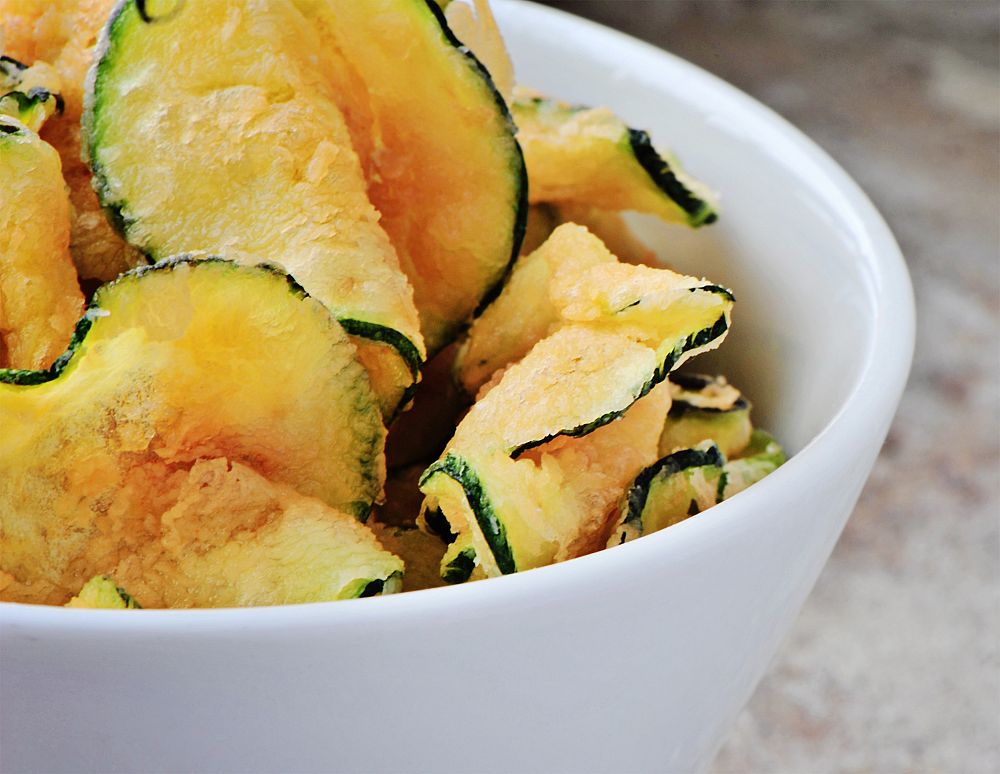
Zucchini Chips
Ingredients
-
2 Zucchinis
-
1-2 tablespoons of olive oil
-
1/2 cup bread crumbs*
-
1/2 cup finely shaved parmesan reggiano cheese
-
Garlic Powder
-
1/2 teaspoon salt
-
Pepper to desired taste
*Gluten Sensitive? They make these in Gluten Free
Instructions
-
Preheat oven to 450 degrees F
-
Slice zucchini into thin slices
-
Place zucchini in a bowl and add olive oil. Toss until all zucchini is coated
-
Combine and mix bread crumbs, cheese, garlic powder, salt, and pepper
-
Dip olive oil covered zucchini in mixture covering both sides and place on wire rack with a cookie sheet or tin foil beneath
-
Bake for about 18-22 minutes.



